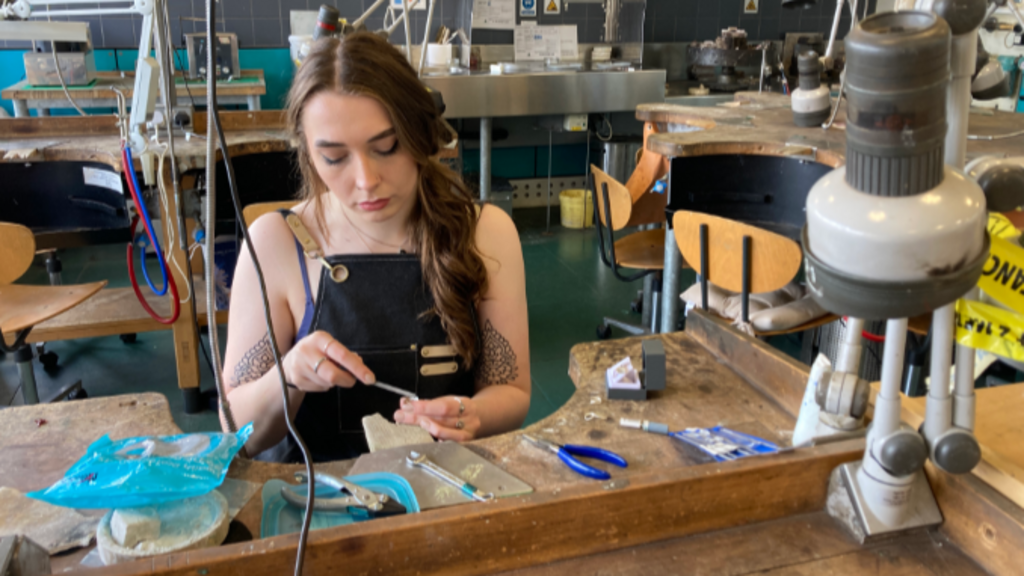Birmingham’s renowned jewelry-making expertise has earned it the prestigious World Craft City status.
World Crafts Council President, Saad Al-Qaddumi, lauded the city’s “rich heritage, skilled artisans, creative designers, dedicated makers, and innovative contributions to the jewelry industry.”
This accolade places Birmingham among only eight other European cities, including Stoke-on-Trent (awarded the status last year for its pottery), to receive this recognition.
The Jewellery Quarter Development Trust (JQDT) hailed the award as “a landmark moment for Birmingham and the wider West Midlands, elevating the city’s historic Jewellery Quarter onto the global stage.”
Situated near the city center, Birmingham’s Jewellery Quarter boasts a manufacturing history spanning over two centuries. Retail outlets emerged only in the 1970s, as manufacturers began direct sales to consumers.
The international judging panel visited the esteemed School of Jewellery (established 1890, housed in a Grade II-listed building on Vittoria Street), participating in silversmithing workshops and observing student artistry and craftsmanship.
The judges’ Jewellery Quarter tour also included the Birmingham Assay Office, Cooksongold, and the historic Coffin Works.
The successful bid was a collaborative effort between the JQDT, Birmingham City Council, and the Goldsmiths’ Company.
Matthew Bott, JQDT chair, stated: “This is a source of immense pride—not just for the Jewellery Quarter, but for Birmingham and the West Midlands. The world now recognizes the exceptional value of our work. Our gratitude extends to all who contributed, and we eagerly anticipate collaborating with existing and new partners to build upon this achievement.”
Leveraging this designation, the JQDT, with support from city curator Alex Nicholson-Evans, plans to launch the Birmingham Jewellery Biennial, the UK’s premier jewelry festival.
This citywide celebration will encompass open studios, jewelry fairs, heritage tours, a trade conference, and a flagship exhibition showcasing internationally acclaimed and emerging artists through a UK-wide open call.
Ms. Nicholson-Evans, speaking on BBC Radio 4’s Today programme, expressed that “we finally get to share with the world what we’ve always known.” She highlighted the Jewellery Quarter’s two-century-plus history, its role in producing over 40% of British jewelry, and its world-renowned assay office.
Her position, commissioned by Colmore Business District, involves collaboration across five city center districts “to ensure Birmingham remains a vibrant place to live, work, and conduct business.”
The JQDT emphasizes that this status unlocks international partnerships, funding, and collaborative opportunities for the Jewellery Quarter, Birmingham, and the West Midlands.
A JQDT spokesperson stated: “With both the Jewellery Quarter and Stoke-on-Trent recognized as World Craft Cities, the West Midlands is rapidly becoming a national leader in celebrating craft as culture.”
Follow BBC Birmingham on BBC Sounds, Facebook, X and Instagram.
Metal detectorist Malcom Weale says he “did a bit of a dance” after finding a gold mourning ring.
The new T-level students on the Aston University course aim to bring new blood to the industry.
Dorset Museum is raising £9,000 to acquire the 3,000-year-old Crichel Hoard of gold ornaments.
Trade wars and volatile markets have contributed to a gold rush, but investors shouldn’t put all their eggs in this one basket, warn experts
Reporter Nicola Goodwin tells the Herefordshire Hoard tale in Strange But True Crime on BBC Sounds.

